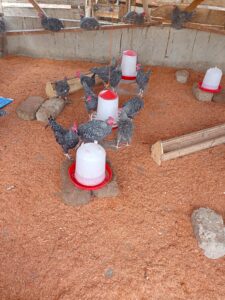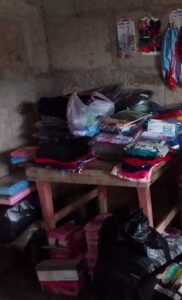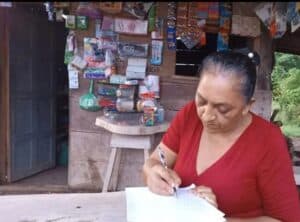Graduate’s business creates employment

Graduate Samuel (right) in front of cropping house
Samuel completed a course in mushroom production at Self-Help International’s Frances Mueller and Virginia Lageschulte Training Center (FMVLTC) in June 2014, and now has a growing business that is creating employment, improving the environment, and providing a more nutritional food source for the market.
Last month, Samuel started up his mushroom business in Offinso, a town in the forest region of Ghana with several timber mills. These timber mills produce tons of sawdust causing considerable environmental pollution due to inefficient waste management practices. The sawdust is sometimes set on fire to eliminate it, and other times carried away by wind with the potential to cause lung infection and other respiratory diseases. Samuel’s business makes use of this sawdust for composting, thereby offering some relief in minimizing this environmental menace. He tells SHI the abundance of sawdust for composting reduces his production cost. He only pays for transportation. It costs 30 pesewas ($0.10) to produce a 1.5kg bag of sawdust compost which sells for one cedi ($0.33). Meanwhile, one 1.5kg compost bag produces 6 cedis worth of mushroom ($2.00), a significant return on investment.
Samuel sees a lot of profitability in mushroom sales since most mushrooms currently available on the market are wild mushroom, which are seasonal and expensive during lean seasons. As an accountant, he is aware of the significant benefits of taking a loan from SHI, where the interest is a flat rate without any additional hidden fees that are charged by most commercial banks in Ghana. With his loan, he was able to invest in building the cropping house for his mushroom.

Mamuna, Awudu, & Zakaria bagging compost
Yet he is motivated not only by profit from his business but also his contribution to creating employment for the youth. By October, he had already created new job employing three people who were formerly unemployed. Awudu and Zakaria are both full-time employees who assist with composting and bagging for mushroom production, and Mamuna works part-time.
Samuel has big plans to grow this business into three major cities, creating even more employment as the business grows. He and his wife have one son and one adopted daughter (niece) in their care. Even though he has a day job as an accountant and his wife works as a nurse, he says it would be challenging for them to care for the children’s needs and school fees without this supplementary income. He plans to expand by marketing the mushrooms to hospitals as well since they are currently promoting low cholesterol diets and increased vegetable consumption.
With the outbreak of Ebola in Africa and heightened education for people to stay away from bush meat, availability of skills and resources for people to go into agro-based enterprises such as rabbit rearing and mushroom production will not only create employment for the youths, but will also provide more affordable and healthier nutritional sources, which minimizes morbidity rates and increases productivity. Thank you for your support of Samuel’s business, which is providing better livelihoods, healthier foods, and safer environments for many residents of the Ashanti region.




